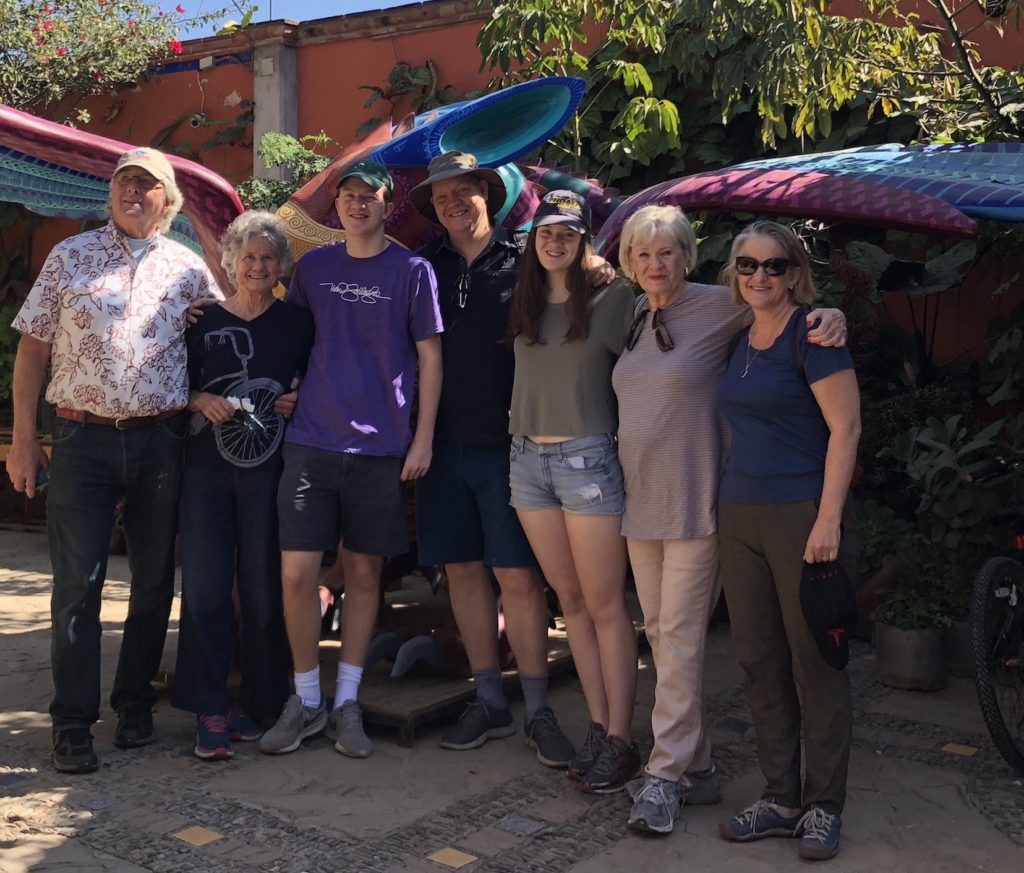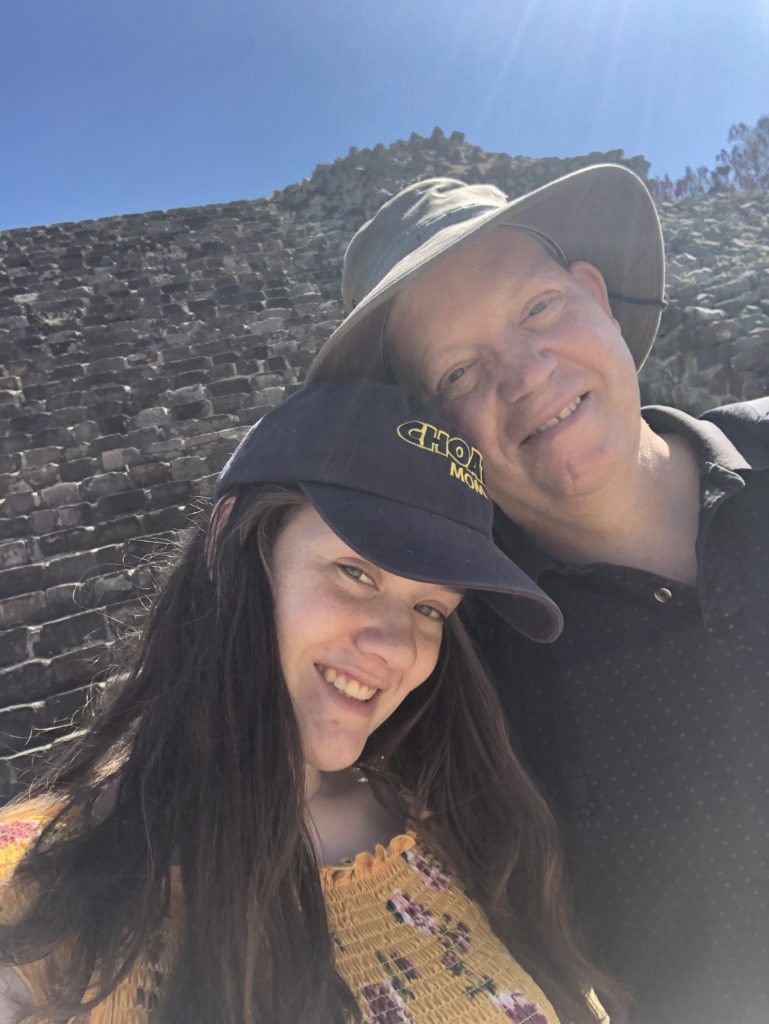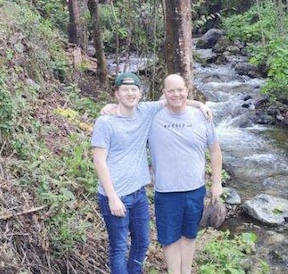In between Christmas in snowy Short Beach and MLA in chilly Chicago, I snuck away with family from both the east and west coasts to spend a glorious few days in the mountains of Oaxaca, Mexico. The full tale of food, Zapotec ruins, hiking, wood carving, mezcal, mole, tacos, fiestas, and other wonders would be long to tell.

A welcome and unplanned part of our almost-week at the Casa Colonial on the outskirts of downtown was visiting with the other guests. Breakfast and dinner each day at the Casa was a kind of pop-up salon, featuring an amazing group of people, including an Australian expert in Indonesian textiles who works at the Fowler Museum in LA, a master guitar craftsman from Chelsea & Woodstock, a painter from Manhattan and Brooklyn, a Methodist minister from Chapel Hill, and – to my particular interest and pleasure – a climate change activist named Larry Gussin. Larry’s a co-founder of Nest, one of the first companies to use computer technology to increase energy efficiency. After Google bought Nest, he has become since 2012 a full-time activist working in support of carbon pricing initiatives, mostly, and managing a donor advised fund at the Sierra Club Foundation .

After we met, I sent Larry a link to my website. To my great pleasure, he came to the New Year’s Day Fiesta armed with a great question I’m still mulling: “Is shipwreck” [in my eco-theory sense] “an elaboration of technological incrementalism in the face of environmental hostility, or is it part of the ‘burn it all down’ radicalism” that Larry in his own work been struggling against in recent years? He describes himself as a leftist who in recent years has been mostly fighting with the left, because he supports market- and technology-based mitigations. I believe he was a supporter of the failed carbon pricing initiative in Washington State this past fall.
Update: I garbled that last point a bit. Larry emailed to clarify his stance on the WA carbon pricing initiatives. He writes: “I supported the 2018 WA carbon tax effort in 2014-15 with $45,000 in seed $ and volunteering, but opposed the proposal from 2016 on as I thought it was being written to only appeal to the left in a purple state. In the end 1 in 4 of the voters for the reelection of liberal senator Maria Cantwell voted against the carbon tax: I was right.”
He’d read my manifesto-ish PMLA article “After Sustainability,” and we talked about what counts or does not count as a “pastoral” or a vision of stasis in environmental thinking. We also talked about what counts as radical or revolutionary, and whether climate change activism can avoid the vortex of partisanship in our Trumpy present. I suspect it can’t over the next two years of highly polarized political conflict in the US – but in a post-orange menace medium term, I agree with Larry that we need a climate solution that isn’t only partisan. I don’t believe that in the US it’s possible to have the left “win” in a permanent or decisive way – though I certainly think the current version of the right deserves to lose.

I didn’t quite figure it out enough to say it over mezcal & grilled cactus on New Year’s Day, but Larry’s technological and carbon-pricing-based vision might be better thought of as georgic rather than pastoral. He presents a vision of skilled human labor – the sort of skill that built Nest and Google – engaging technically and carefully with our dynamic environmental conditions. There are things not to love about the georgic tradition, including the settler colonialism legacies that flow from both its Virgilian / Roman sources and from its early American rearticulations. But a solar and renewable georgic might be just the thing in 2019. (On my MLA panel yesterday, Jesse Oak Taylor & I were talking about Jedidiah Purdy’s After Nature, which also makes a quasi-georgic argument about American history.)
Larry has been jousting recently with what he calls the “burn it all down” anti-capitalist left, which for him seems represented in part by Naomi Klein, and perhaps also by Alexandria Ocasio-Cortez and at least some maximalist versions of the “Green New Deal.” I didn’t let on that, though I’m ambivalent about Klein’s melodramatic view of history, I kinda love AOC, and have some hopes for what she’s bringing to Washington. Leftist radicalism seems to him both politically impossible and perhaps also environmentally counterproductive, because it rejects the expertise and techno-precision that he believes in. Given that I’m mostly immersed in leftier-than-me academic culture, it was an interesting perspective.

So — to answer Larry’s question — where do my ideas about shipwreck and swimmer poetics fall in the spectrum between burn it all down and tecno-incrementalism? I guess a bit on both sides: shipwreck stories attract through their implicit radicalism, in which great ships go down and human hopes are dashed. But the survival narrative, which includes the story of shipwrecked swimmers and the sailors who cling to broken spars, relies on expertise, labor, patience, and perhaps a bit of luck. The break-plus-recovery narrative that I wrestled with in my book Shipwreck Modernity has feelers in both technical and radical discourses.
It was a great afternoon of food, drink, and eco-conversation. We talked about Odysseus, who goes home to stay in Homer, but who is later goaded out into the open sea by Dante and Kazantzakis. What is it about home that resists narrative? Why can’t we let heroes rest? Why are human stories so impatient?

We also talked, with contributions from all the generations of the family, about Tolkien’s hobbits and the Shire as eco-vision: a precious spot, a place that does not know its own peril, and a community worth sacrificing oneself to preserve. The Shire remains a bit green for my blue/oceanic tastes, especially in the films, but that short glimpse of the Scouring of the Shire that Sam sees in the Mirror of Galadriel (films only) might represent a painful near-future today. I wonder also about the sea that cradles Middle Earth and the brief hints of oceanic voyages in Tolkien’s mythology.
We talked about the “Creating Nature” symposium I’m organizing for May 2019 at the Folger, and my hopes to foster dialogue between eco-literary types and scientists, legal scholars, philosophers, and other interested parties. The entanglement between what we call “human” and what we call “Nature” has a long and complex history; part of my project as historicist and Shakespearean ecocritic seeks to surface premodern ways of understanding the relationship between humans and our nonhuman environment in ways that speak to today’s shifts and changes.

After the New Year’s Fiesta came 18+ hours of travel out of Mexico on Wednesday and a very full day at MLA yesterday. With the conversation at the Casa very much on my mind, I spoke yesterday on a great panel, “Climate Humanism and the Inhuman Turn,” organized by eco-Gandalf Jeffrey Jerome Cohen. I started writing this post amid chaos and bad wifi at the Mexico City airport, thinking about the talk I was about to give in Chicago and about the past few days of conversations in Oaxaca. It turns out family vacation makes a great prelude to academic conferencing!
I’ll close with the ending of yesterday’s talk, which I am starting to think of as a way to imagine the oceanic encounter as break-and-continuity, a way to preserve some aspects of the “human” while recognizing the inhuman vastness and dynamism of the climate in which we live. I was talking mostly about Jonah, and about what his story means today. But I wonder if there are political and strategic implications for eco-activists and their fellow travelers.
Here’s the last bit –
We must combine our human need to reform the great city with our awareness of the nonhuman plurality that environs our bodies.
The human in the prophet preaches repentance, change, and survival. (Good eco-georgic values! Good swimming virtues! The technology of human endurance!)
The nonhuman into which the prophet dives promises shock, disorientation, and possibilities we cannot contain. (The revolutionary urge! The lure of change and difference!)
We need both.
I wonder if Larry would agree with me?